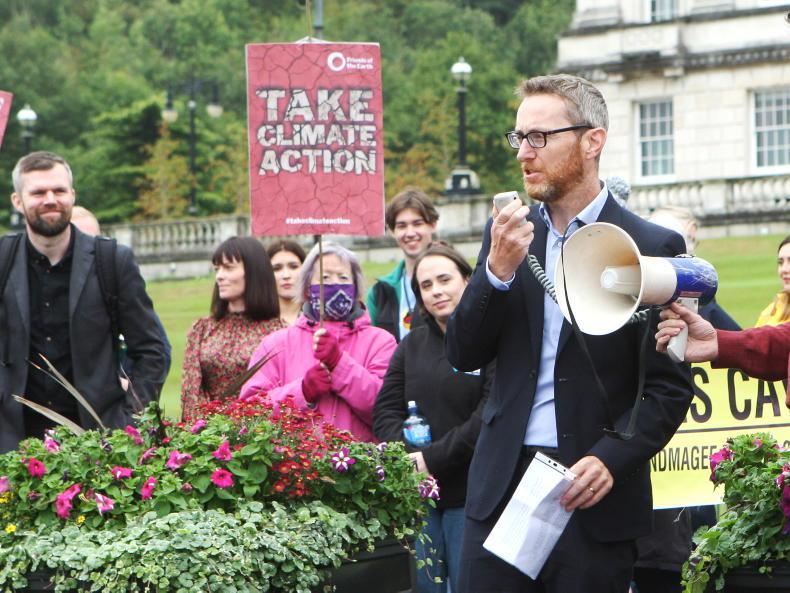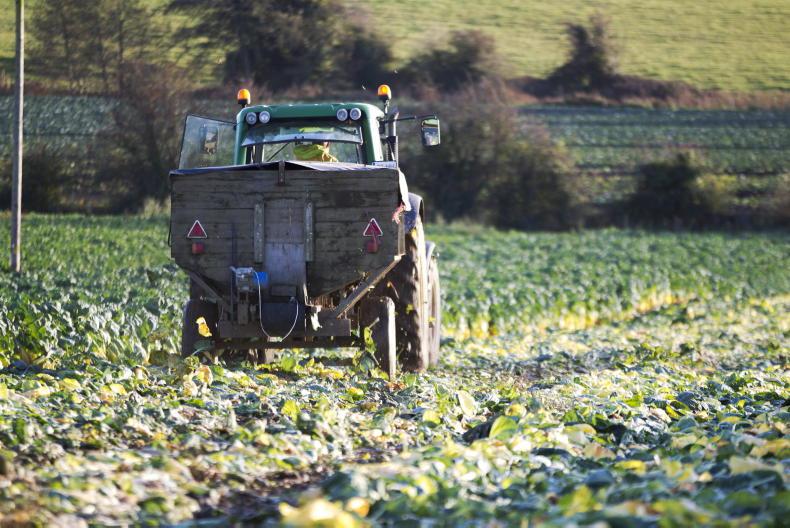On Tuesday, Sinn Féin and the Green Party successfully brought forward an amendment to a climate bill in the Northern Ireland Assembly which changed its headline emissions target to net zero by 2050.
The only impact assessment of a net-zero target for NI was conducted by the consultancy firm KPMG. It found that it will require an 86% reduction in cattle and sheep numbers and that 98% of beef and sheep farms in less favoured areas will go out of business.
Sinn Féin tried to deflect this by bringing forward an amendment for a “just transition fund for agriculture”. But with no details of how this would be funded, it was clear that talk is cheap.
The party in NI has not been listening to their colleague in the Dáil, Matt Carthy. He has been prolific in calling out the Irish Government on vague promises of a “just transition” and questioning how emissions targets will affect small farmers.
At Stormont on Tuesday, it was also disappointing to see Philip McGuigan, Sinn Féin’s environment spokesperson, misquoting a different report by KPMG, which was commissioned by the Irish Farmers Journal. He suggested that NI farmers could follow farmers in the south in cutting emissions by up to 30% by 2030 solely through improved efficiencies and technologies.
McGuigan conveniently left out the rest of KPMG’s analysis, which found the 2030 target will require a 22% cut in the beef herd, an 18% cut in dairy cows, and 56,400 job losses.
This week's cartoon:

\ Jim Cogan
Crisis for vegetable growers
As Minister for Agriculture Charlie McConalogue continues to place his focus on emissions from dairy, vegetable growers are leaving their businesses behind. They are struggling to agree price increases with supermarkets to cover rising costs driven by fertiliser, energy and packing.
In this week's edition, Cathal Lenehan explains that his business is no longer sustainable. The Lenehans, who grow cabbage and brussels sprouts, will harvest their last crops by June.

Harvesting sprouts on Cathal Lenehan's farm on a sunny November day at the bottom of the Hill of Tara, Co Meath.
These growers will not be replaced. They have built their businesses and increased scale in order to compete, but scale is now becoming their downfall when income will not cover costs.
Emission reduction targets are hot topics in agriculture, yet the low-emission sectors are not being supported.
How is it sustainable to allow the Irish vegetable area to decline and import product from places which often have lower production standards and put little thought into greenhouse gas emissions?
A government and opposition not committed to farmers
Speaking at the IFA AGM last week, An Taoiseach Micheál Martin made it clear there would be no free passes for agriculture should its emissions not reduce in the years ahead. The warning comes despite his preparedness to grant a pass to data centres, big tech, aviation and shipping, alongside the willingness of Government to ignore the flaws in territorial emission reduction targets for a country that feeds almost 10 times its population. What is clearly emerging is that a Fianna Fáil/Fine Gael-led coalition alongside a Sinn Féin-led opposition that, from its actions in Northern Ireland, has no commitment to farmers, has created a government and political arena that has grown apathetic to the challenges facing farmers and rural Ireland.
On Tuesday, Sinn Féin and the Green Party successfully brought forward an amendment to a climate bill in the Northern Ireland Assembly which changed its headline emissions target to net zero by 2050.
The only impact assessment of a net-zero target for NI was conducted by the consultancy firm KPMG. It found that it will require an 86% reduction in cattle and sheep numbers and that 98% of beef and sheep farms in less favoured areas will go out of business.
Sinn Féin tried to deflect this by bringing forward an amendment for a “just transition fund for agriculture”. But with no details of how this would be funded, it was clear that talk is cheap.
The party in NI has not been listening to their colleague in the Dáil, Matt Carthy. He has been prolific in calling out the Irish Government on vague promises of a “just transition” and questioning how emissions targets will affect small farmers.
At Stormont on Tuesday, it was also disappointing to see Philip McGuigan, Sinn Féin’s environment spokesperson, misquoting a different report by KPMG, which was commissioned by the Irish Farmers Journal. He suggested that NI farmers could follow farmers in the south in cutting emissions by up to 30% by 2030 solely through improved efficiencies and technologies.
McGuigan conveniently left out the rest of KPMG’s analysis, which found the 2030 target will require a 22% cut in the beef herd, an 18% cut in dairy cows, and 56,400 job losses.
This week's cartoon:

\ Jim Cogan
Crisis for vegetable growers
As Minister for Agriculture Charlie McConalogue continues to place his focus on emissions from dairy, vegetable growers are leaving their businesses behind. They are struggling to agree price increases with supermarkets to cover rising costs driven by fertiliser, energy and packing.
In this week's edition, Cathal Lenehan explains that his business is no longer sustainable. The Lenehans, who grow cabbage and brussels sprouts, will harvest their last crops by June.

Harvesting sprouts on Cathal Lenehan's farm on a sunny November day at the bottom of the Hill of Tara, Co Meath.
These growers will not be replaced. They have built their businesses and increased scale in order to compete, but scale is now becoming their downfall when income will not cover costs.
Emission reduction targets are hot topics in agriculture, yet the low-emission sectors are not being supported.
How is it sustainable to allow the Irish vegetable area to decline and import product from places which often have lower production standards and put little thought into greenhouse gas emissions?
A government and opposition not committed to farmers
Speaking at the IFA AGM last week, An Taoiseach Micheál Martin made it clear there would be no free passes for agriculture should its emissions not reduce in the years ahead. The warning comes despite his preparedness to grant a pass to data centres, big tech, aviation and shipping, alongside the willingness of Government to ignore the flaws in territorial emission reduction targets for a country that feeds almost 10 times its population. What is clearly emerging is that a Fianna Fáil/Fine Gael-led coalition alongside a Sinn Féin-led opposition that, from its actions in Northern Ireland, has no commitment to farmers, has created a government and political arena that has grown apathetic to the challenges facing farmers and rural Ireland.








 This is a subscriber-only article
This is a subscriber-only article











SHARING OPTIONS: